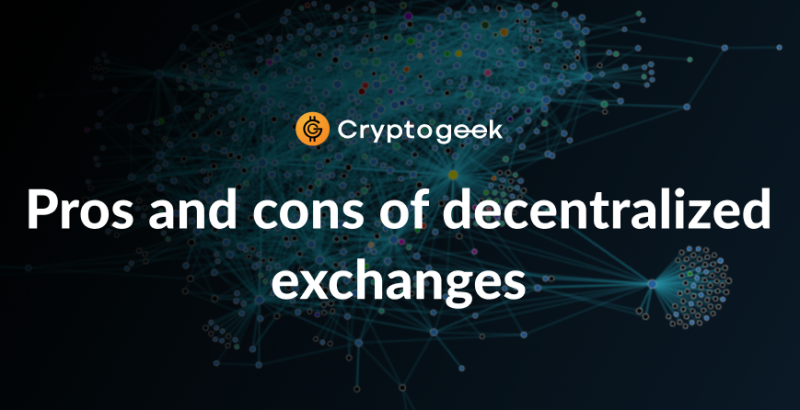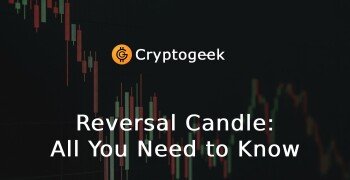Pros and Cons of Decentralized Exchanges: Why DEXs Are Barely Used?


So many people speak of how good decentralized exchanges are, and so few actually use them. By some accounts, as of January of 2019, the trade volume of decentralized exchanges reached only 0.25% of the combined trading volume of all crypto exchanges. At the same time, if you are no stranger to Reddit and Twitter discussions about cryptocurrency you might notice that many people consider decentralized exchanges (DEXs) to be a powerful alternative to currently dominating centralized cryptocurrency exchanges (CEXs). Let’s figure out why these people do not vote for DEXs with their own money, but first, let’s try to understand what decentralized exchanges are.
- Differences Between Centralized and Decentralized Exchanges
- Pros of Decentralized Exchanges
- Cons of Decentralized Exchanges
- Conclusion
- Pros, Cons, Examples
Differences Between Centralized and Decentralized Exchanges
Most of the exchanges are centralized. It means that each of these exchanges has an authority to control the deposits of capital, order books, and order matching. Only the traded assets themselves are decentralized on the centralized exchanges. Centralized exchanges have to store their users’ personal information because of KYC (know your customer) and AML (anti-money laundering) regulations.
Decentralized exchanges don't use a central server and the networks' nodes are distributed. Technically it means that these exchanges are maintained by users. Blocknet BlockDX is an example of a fully decentralized exchange while many other DEXs have some elements of centralization.
Decentralized exchanges can be currency-centric or currency-neutral. Currency-centric exchanges are associated with certain blockchains — for example, if it's built on top of Ethereum, then it will be compatible only with ERC-20 tokens. Currency-neutral exchanges provide users with more freedom as they aren't associated with the only blockchain. Such exchanges are truly p2p as order books, matching, and deposits take place on the blockchain. One of the vivid examples is Bisq. Some traders can exchange their assets via atomic swaps (that's a simple operation between two traders who exchange their assets to one another).
Essentially DEXs are smart contracts. Traders are required to provide a specific amount of coins or liquidity to fulfill an order associated with a certain smart contract. The funds are not released until all parties perform their commitments to the fullest. Some traders use a different method: a trader proposes a trade, the transaction gets signed and the order book gets added to the blockchain when both sides come to an agreement. That's when the coins get swapped between the wallets of buyers and sellers. Swapping requires no fees. This is what makes DEXs cheaper in use.
Centralized exchanges are user-friendly and remind of the conventional banks while DEXs are less usual and convenient for most people. More than that, currency-centric exchanges have a small choice of trading instruments. More than that, DEXs don't support fiat money. This circumstance makes decentralized exchanges unattractive for institutional traders and first-time buyers. These factors result in small attendance on decentralized exchanges which leads to a smaller trading volume of these exchanges. Also, we should remember that decentralized exchanges have appeared not so long ago. That's another reason for its low liquidity.
Pros of Decentralized Exchanges
The Lack of Middlemen
Decentralized exchanges follow the initial philosophy of cryptocurrency and aspire after being transparent, anonymous and... decentralized. DEXs removes middlemen from cryptocurrency trading, providing peer-to-peer trading process. What does it mean practically? It means that transactions can be processed for free (although it depends on the architecture of a certain DEX), and all the transactions can be tracked in the ledger, but participants of the trade cannot be identified as their data is not collected by the exchange. In case if the DEX information leaks, your personal data won't be compromised as you are not required to share it with the exchange.
That's totally opposite compared to what happens on centralized exchanges that collect personal data and charge fees for transactions and trading. KYC (know your customer) procedure can be applied to some users in order to validate their identity and let them withdraw their coins. This procedure is associated with collecting exceptional data including ID, photos, etc. More than that, users of centralized exchanges do not own their private keys. The money they hold on the exchange is under the total control of the company while the use of DEXs requires no trust in a third party.
Better Security
Centralized exchanges have a simple structure. It makes them more vulnerable to hacker attacks. There were many cases when huge amounts of money were stolen from such large exchanges as Binance, Mt Gox, CConraillead, etc. DEXs are more sophisticated which makes it a harder target for hackers. More than that, there is less money volume on the DEXs, so it is another factor that makes decentralized exchanges a less attractive piece of pie for thieves. As it was mentioned before, thanks to the anonymity of decentralized exchanges, even if hacking takes place, users do not have to worry about the leak of their personal data.
But despite that, DEXs sometimes get hacked too. Hackers can use breaches in smart contracts to steal money. One of the cases was exceptional because a hacker managed to steal a really huge amount: in 2018 $23.5 million worth of cryptocurrencies were stolen from a decentralized exchange called Bancor Network.
Cons of Decentralized Exchanges
Some DEXs Are Quite Centralized
Sometimes decentralization of allegedly decentralized exchanges is questioned by researchers and users. For example, Bancor that was mentioned above managed to successfully freeze the assets of its users through a smart contract. Considering an allegation that Bancor was the only market maker we can assume that this decentralized exchange is rather quite a centralized one.
Some people consider that the DEX platform launched by Binance is rather created to increase the trading volume of BNB as many trading pairs on this DEX are associated with this token and it's hard to avoid trading it. So not always intentions of DEXs’ developers are as pure as it's alleged.
In most cases, DEXs are created and maintained by anonymous teams of developers. One of the rare examples of a transparent team behind a decentralized exchange is 0x — anyone can see all the team members on the 0x website.
It needs to be mentioned that the profit which DEXs’ developers get from their product is not always clear.
Low Liquidity
For years decentralized exchanges have low liquidity. There are many reasons why not many traders use DEXs. Some people are used to have more trust in authority (such as banks, etc), so they feel better when they know that the service is under control of some entity. Another reason is that DEXs use numerous protocols and it's not always attractive for the mainstream audience to figure out how this or that decentralized exchange works while centralized exchanges tend to provide an intuitive interface.
Low liquidity becomes a problem that worsens itself because exchanges with small trading volumes attract fewer traders and liquidity gets even lower. Traders do not like to post orders on the exchange with low liquidity because their trading strategy may not work under these conditions.
Low liquidity causes serious troubles for the DEXs users. The prices on DEXs can drastically differ from those on centralized exchanges. Sometimes it takes time to find a matching order. This circumstance creates additional risks. Trading in large amounts on the exchanges with low liquidity is reckless, if possible at all. High liquidity of the biggest centralized exchanges makes trading much faster and safer (because you buy and sell for the relevant prices).
Limited Functionality; Interface Isn’t Simple
Kraken provides margin trading option for those who are ready to try trading in larger amounts, Coinbase supports fiat money which makes crypto trading more accessible for anyone, HitBTC has a convenient tutorial tool known as Demo Mode which can also be useful for the beginners. Large centralized exchanges provide means to secure yourself from misfortune in trading (stop-limit orders, etc), the support of crypto-bots, sophisticated graphs, and so on. The interface is usually intuitive. Sadly, none of the things mentioned above are typically available on decentralized exchanges. The interface is usually not user-friendly, not many coins are supported (fiat money is not supported), and only the basic trading features are presented on DEXs.
The reasons for that can be different. For example, it could be a lack of strong financial support of dev teams plus we should remember that DEXs appeared only in 2015, probably they haven't had enough time to overcome many of the mentioned problems. Of course, without loyalty from the government side, DEXs won't be able to work with fiat money legally.
Security Issues
Although it was said earlier in this article that DEXs provide better security there's a different problem: I can't remember any DEX providing any kind of insurance for the users' accounts. If you lose your money, in many cases there's nothing you can do about it. There won’t be any compensation and nobody will be sued. As DEXs don't raise money (don't take fees for transactions) they don't have a capital that could compensate the assets stolen from the users. On DEXs security is the responsibility of its users themselves. On the contrary, centralized exchanges often provide some opportunities to regain losses in such situations, even though it’s not always the case.
Conclusion
Yes, as an abstract idea decentralized exchanges are beautiful. If you look closer, you might notice numerous flaws, but as many others suppose, as time goes by, DEXs will progress and one day they will probably become much more efficient. It's hard to say if it happens any time soon, though. The potential of this idea is as good as the idea behind Bitcoin, but just like Bitcoin (and many other blockchain projects), DEXs are not prepared for mass adoption yet. People still use fiat money and centralized exchanges.
Pros
— Free transactions
— Transparent process
— Anonymity, no KYC
— Better security
— You own your private keys and coins
Cons
— Low liquidity
— Slow trading process
— Trading in large amounts is impossible
— Not user-friendly
— Limited functionality
— Fiat currencies are not supported
— Unstable currency prices
— No compensation for losses
Some popular decentralized exchanges: Bisq, IDEX, Binance DEX, 0x, BlackHalo, Coinffeine, Blocknet, Waves DEX.
Some popular centralized exchanges: Binance, Kraken, Coinbase, Huobi, HitBTC, Bittrex, OKEx.









You can't apply most of your strategies there